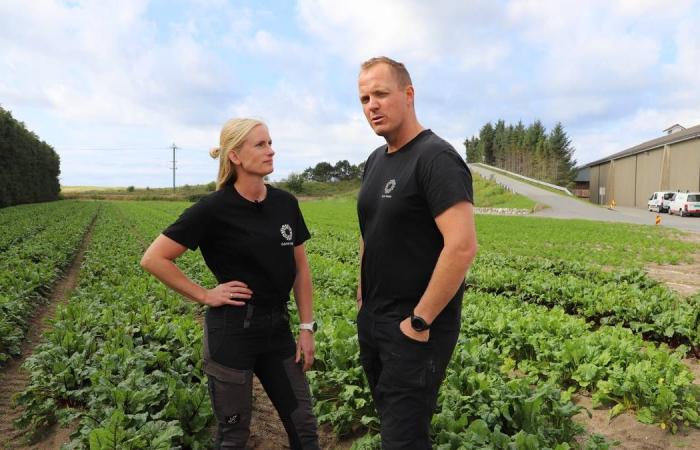– The question now is whether we should spend time and money plowing everything into the ground, or whether it should just stand and rot. Those are the two choices we have now, says farmer Sigbjørn Skjørestad (38).
Skjørestad runs Ogna gard in Hå municipality in Rogaland together with his wife Marthe Skjørestad (35). In 2020, the couple started carrot production. They made it into the mass market, and the future prospects looked good.
They have around 150 acres of carrots which are now in danger of being plowed down.
Photo: Håkon Jonassen Norheim / NRK
Uses twice as much power
Last year they had a turnover of NOK 12.5 million. They made a profit. But not anymore.
Now 100-150 acres of carrots can be lost.
– Now we use twice as much electricity as we earn from the carrots per month. And that’s before we deduct the costs of planting and producing carrots. Then there is no way around picking them up. It’s simple mathematics, says Sigbjørn.
It’s a tough everyday life for the young married couple. Now they spend much of their free time at the kitchen table. They have big decisions to make.
– If we stop with carrots, we will have to shut down the operation. Then we have to find other things to do, says Sigbjørn.
Now they and other carrot farmers need help.
Marthe and Sigbjørn Skjørestad will have to look for other work if there is not a crisis plan from the government.
Photo: Håkon Jonassen Norheim / NRK
– Carrot production is a heavyweight on the Norwegian table. That is why this is so relevant to so many. It’s serious and we need help. Fast, says Marthe.
A few hundred meters further north is one of Norway’s largest carrot producers, Bru Gard. The farm has around 70 employees, and has been run for several generations.
Uses 75,000 kilowatt hours
The government currently pays 80 per cent of electricity costs above 70 øre. For the greenhouse industry there is no upper limit, but for agriculture there is a ceiling of 20,000 kilowatt hours.
It is far from enough for the young farmers in the south of Rogaland.
– We are in the middle of a power-intensive production. The carrot in the field will soon go into cold storage. It has to be cooled down to zero degrees, which requires an enormous amount of energy. There is talk of 45,000 kilowatt hours per month to cool the carrot between September and March, says general manager of Bru gard, Asbjørn Stokkeland.
In addition, they produce a lot of onions. It must be dried, and requires a storage temperature of around 20 degrees. In addition, the humidity must be dried out. This requires 30,000 kilowatt hours per month.
– This means we are up to 75,000 kilowatt hours per month, just to operate cooling and drying. The government’s ceiling is a drop in the ocean for a vegetable producer, he says.
Carrot producer Asbjørn Stokkeland uses 75,000 kilowatt hours of electricity each month between September and March.
Photo: Håkon Jonassen Norheim / NRK
The electricity bill has increased by 3 million
He will harvest the carrots himself, although it will probably be at a loss. He feels a responsibility to ensure that Norwegians have Norwegian carrots on the dinner table even through the winter.
– With the stipulated prices, we will pass around NOK 3.5 million in electricity expenses during the year. Normally, we are between NOK 500,000 and 700,000. It is completely beyond.
The farmers have fixed prices, which are negotiated in the agricultural settlement. This means that they cannot increase the prices they receive for the food they produce. Skjørestad fears that more young farmers will do as the Skjørestad couple did.
– There are many young farmers who have not built up capital over time, which makes this very demanding, he says.
Leader of the Rogaland farmers’ association, Marit Epletveit, believes it is very worrying.
Photo: Odin Omland / NRK
Leader of Rogaland farmers’ association, Marit Epletveit, believes it is very dramatic.
– It is dramatic for Norwegian food production and our own ability to be self-sufficient. When the economy is such that one considers plowing down fully edible food, it is dramatic for Norway as a country.
She hopes the politicians will take action.
– I think it is important that we as a country provide our own food and that those who produce get an electricity support scheme that makes it worthwhile for them to take on the job of storing the vegetables throughout the season.
Agriculture and Food Minister Sandra Borch is quite clear that as of today there will be no change in the electricity support for agriculture.
– I fully understand that the situation of some producers is very demanding. As of today, the government has no plans for changes to the electricity subsidy for the agricultural and greenhouse industry, but as you know, we are working with arrangements for the business world, she writes in an e-mail to NRK.







